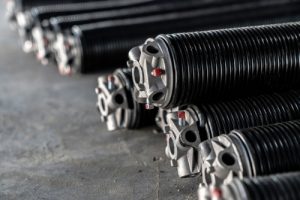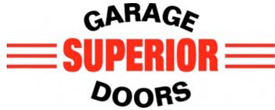 You may be tempted to try to fix your broken garage door springs on your own, but it is hazardous to work with these heavy tension springs and cables without extensive experience. Trust all your garage door repairs to Superior Garage Doors, serving Almont, Shelby Township, Sterling Heights, and the surrounding areas.
You may be tempted to try to fix your broken garage door springs on your own, but it is hazardous to work with these heavy tension springs and cables without extensive experience. Trust all your garage door repairs to Superior Garage Doors, serving Almont, Shelby Township, Sterling Heights, and the surrounding areas.
Understanding Broken Garage Door Springs
Tightly coiled garage door springs create the force that lifts the heavy garage door.
There are two main types of garage door springs:
• Torsion springs: Torsion springs are attached above the garage door opening and turn as the door moves, using torque to lower and raise the door. Strong and durable, torsion springs are the newer version of garage door springs, long-lasting and moving at a controlled, smooth pace. Torsion springs are safer than other springs because the spring is installed around a spring bar. Should the spring break, the noise will be loud but the spring itself won’t move.
• Extension spring systems: Extension springs are mounted on either side of the garage door and extend when the door is in motion. They are the opposing force to the weight of the garage door.
This technology is older and less expensive than torsion springs, but it is common and reliable. Should an extension spring break, however, it can turn into a projectile, which is a precarious situation for anyone or anything within the garage.
Overhead cables are also used in conjunction with garage door springs, attaching to the bottom of the garage door and then being routed to the counterbalance spring to lift the door. Many overhead garage doors have retaining cables which help prevent an extension spring from flying off should it break. Powerful and strong, garage door springs are dangerous if handled incorrectly or carelessly. Repairing a broken garage door spring is not a job for a novice.
Reasons for Broken Garage Door Springs
No matter what type of garage door spring or cable you’re dealing with, when it comes to lifting and lowering garage doors, they are under extreme tension. If your garage door squeaks, shakes, grinds, or moves more slowly than usual, something isn’t right.
There are many reasons garage doors springs can break:
• Wear and tear: Garage doors can last for decades and can usually make between 10,000 to 20,000 cycles – depending on the quality of the springs and proper installation – before the springs start to wear.
• Alignment: If a door is out of alignment, the springs and cables can rub on the track or other hardware, making the springs work hard and accelerating wear and tear.
• Rust: Neglecting to oil the garage door springs contributes to the development of rust, which can wreak havoc on any type of machinery, including springs, causing them to break long before they should. Excess moisture in the garage can also lead to the development of rust.
Garage Door Spring Repair in Shelby Township, Michigan
You can watch a do-it-yourself YouTube video on just about any topic, including how to fix your broken garage door spring. However, just because you can watch a pro do the work or explain it step by step, that doesn’t make this a safe do-it-yourself task. The repair or replacement of garage door springs must follow a careful formula that includes choosing the right type of springs and winding them the appropriate amount for security and effectiveness.
It’s important to hire an expert to service your garage door system to ensure that the proper repair work begins with an accurate diagnosis of the problem. Safety is paramount, and a garage door technician understands the precautions that need to be taken during repairs and the dangers that are possible. Contact Superior Garage Doors at any of their three locations – Almont Garage Door Repair, Shelby Township Garage Door Company, or Sterling Heights Garage Doors – for repair or emergency service of your garage door.
